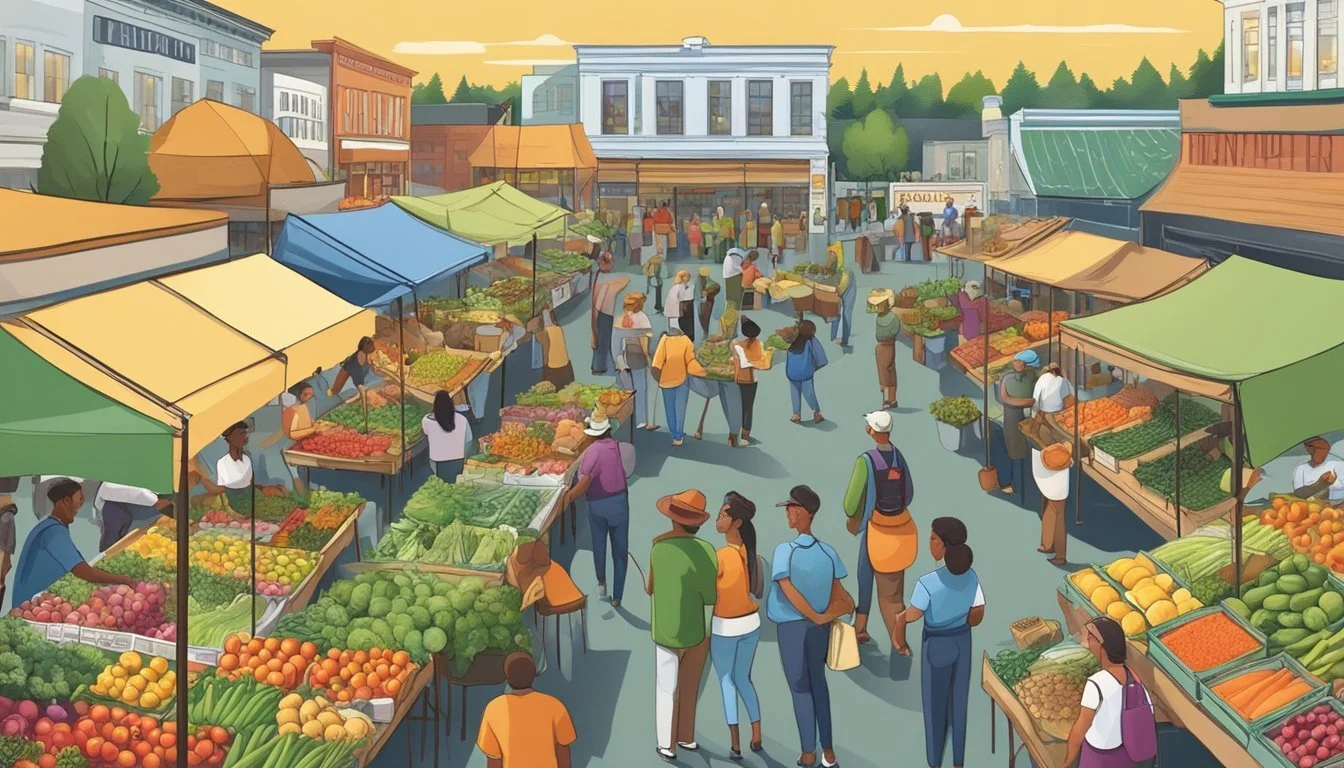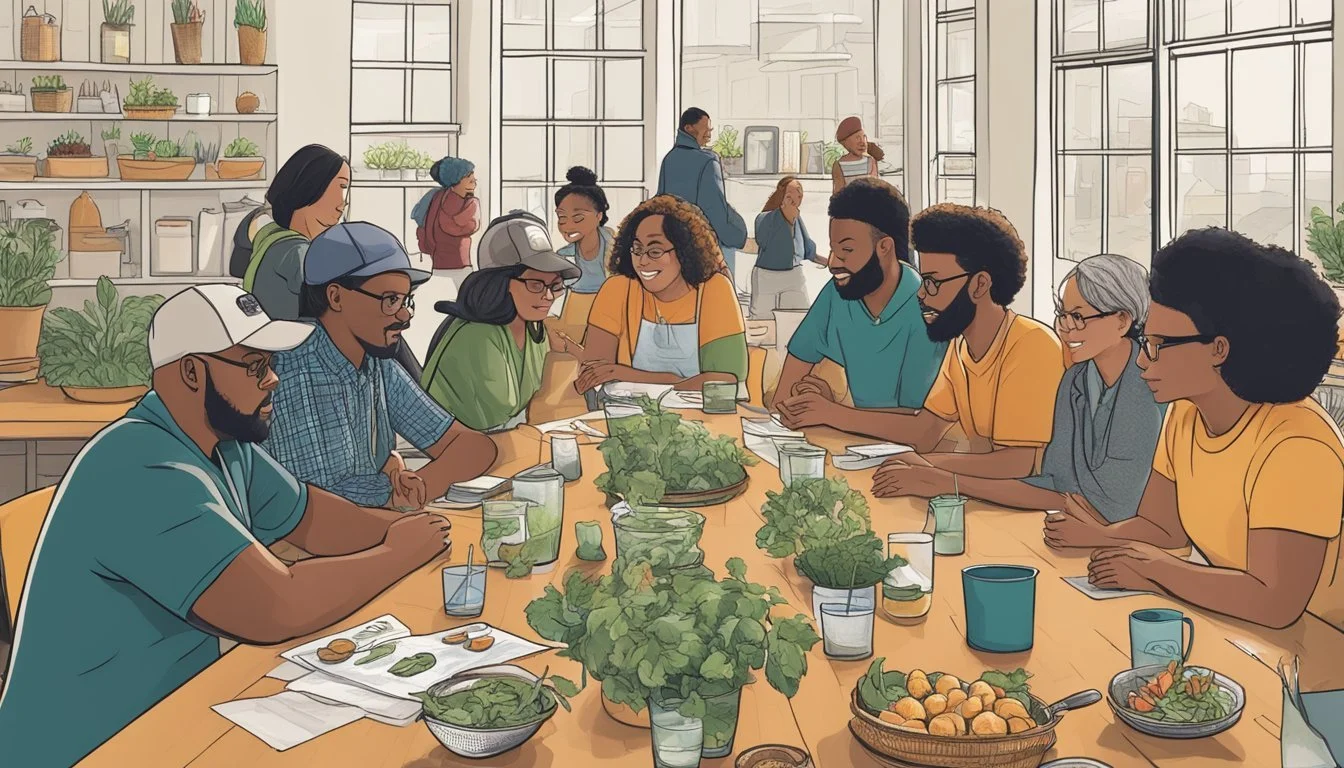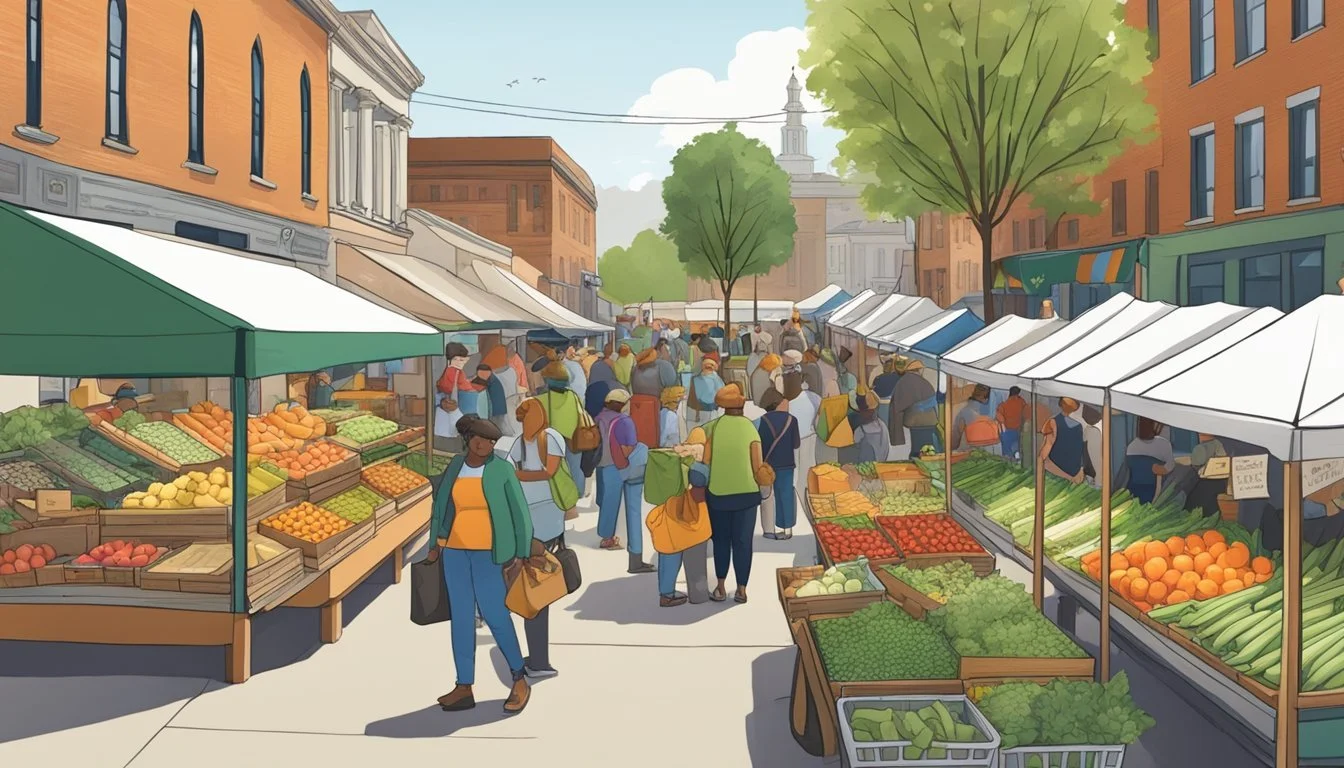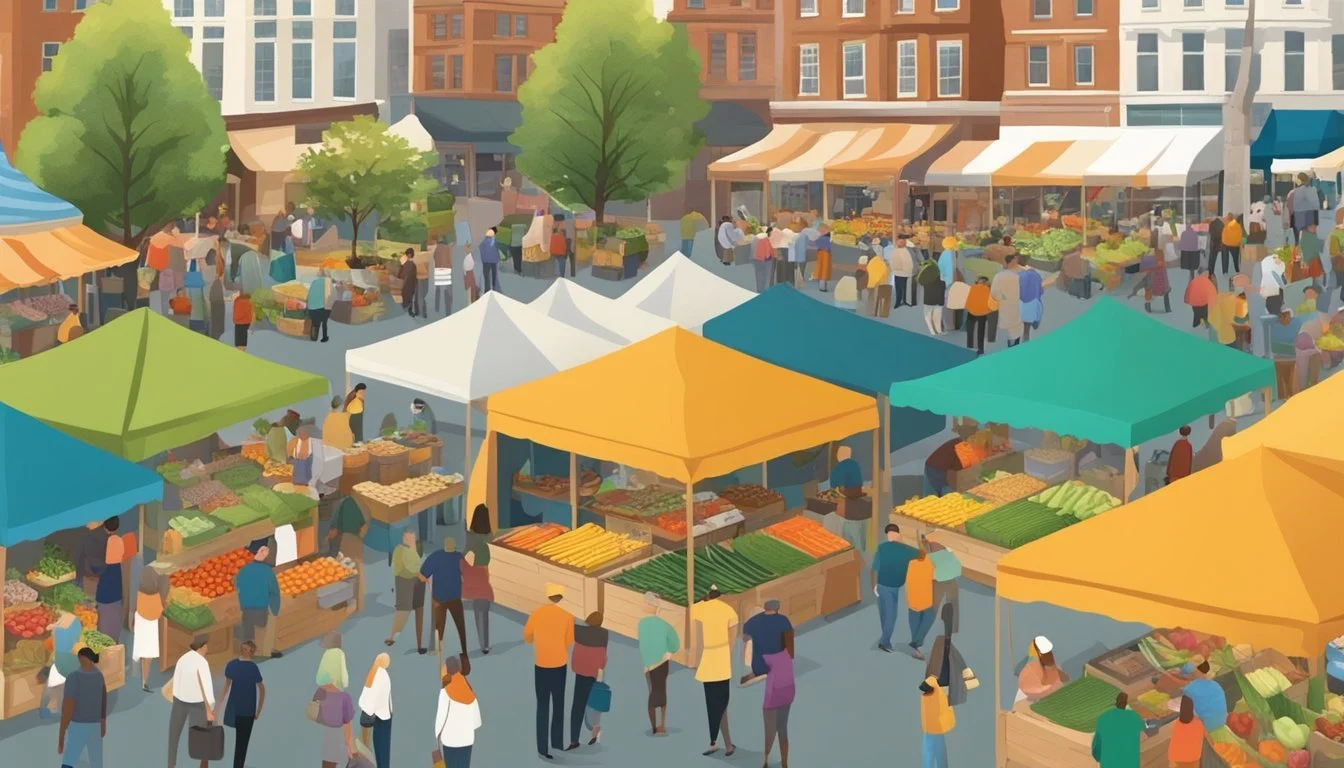Guide to Food Co-Ops in Portland, OR
Your Essential Resource
Nestled within the vibrant city landscape of Portland, Oregon, food cooperatives serve as a testament to the community's commitment to sustainable living and support for local economies. These co-ops are much more than just grocery stores; they are hubs of community interaction and collaboration, providing access to wholesome, locally-sourced foods and products. The ethos surrounding these establishments emphasizes the significance of environmental sustainability and the bolstering of local food producers.
The food co-op movement in Portland has taken on a prominent role in shaping the city's food culture. These community-owned and operated establishments prioritize the best in quality and nutrition, focusing on safe and sustainable growing practices. By shopping at a food co-op, patrons directly contribute to the sustainability of Portland's local economy, strengthening the producer-consumer relationship and ensuring that money spent helps to reinforce community resilience and food security.
Portland's food co-ops are a vibrant and integral part of the city's identity, standing as beacons for responsible consumption and community engagement. They offer consumers not only a place to purchase their groceries but also a chance to become a part of a community that values individual contribution, collective ownership, and the shared goal of nurturing a healthier, more connected society.
History of Food Co-Ops in Portland
The history of food cooperatives in Portland, OR, is rich with community-driven initiatives and a strong commitment to sustainable and local food systems.
Evolution of Co-Ops
In the late 18th and early 19th centuries, Europe witnessed the rise of cooperatives, a model that made its way to the United States and took root in Portland during the Industrial Revolution. The shift from agrarian lifestyles to urban settings lead to the establishment of food co-ops as a means for communities to maintain access to wholesome, affordable food. Over time, these co-ops in Portland evolved, spurred by a growing interest in health, whole foods, and sustainable living.
People's Food Co-op Legacy
People's Food Co-op stands as a testament to the city's legacy of cooperative food initiatives. Originating in the late 1960s as a food buying club by Reed College students, the co-op was incorporated as a nonprofit under the name People's Food Store in 1970. The storefront, located at 3029 SE 21st Avenue, quickly became a cornerstone for the community, providing accessible, high-quality natural foods. As one of the pioneers, People's Food Co-op is not only a grocery store but a community-owned hub promoting a sustainable local economy in Portland, OR.
Benefits of Joining a Food Co-Op
Food co-ops offer a unique combination of benefits that support individual health choices, the local economy, and community cohesion. They provide a direct pathway to purchasing healthier food options and engaging with like-minded individuals who prioritize sustainable living.
Support for Local Economy
Co-ops prioritize sourcing from local farms, thereby injecting funds directly into the community's economy. By choosing to shop at a food co-op, members inherently support local farmers and producers, which helps to cultivate a sustainable local economy. Additionally, co-ops often feature products found at farmers markets, providing year-round access to locally produced goods.
Access to Organic and Fresh Produce
Members of food co-ops gain access to a wide array of fresh, organic produce that is often sourced from local growers. This direct relationship with producers ensures that the co-op can offer a selection of products that meet strict organic standards. Shoppers can enjoy seasonal fruits and vegetables that are not only fresher but also free from excessive packaging, which aligns with eco-friendly practices.
Community Engagement Opportunities
Co-ops are more than just places to buy food; they are hubs for community engagement. By joining a food co-op, members can participate in various educational events and workshops that promote healthy food choices and lifestyle practices. Moreover, co-ops often encourage their members to contribute to decision-making processes, offering a real sense of ownership and involvement in the collective well-being of the community.
Local Food Co-Op Directory
Portland offers a variety of food co-ops that focus on sustainability and supporting local farmers, providing fresh and often organic options to the community. Each co-op brings its own charm and benefits to the neighborhoods it serves.
Southeast Portland Co-Ops
People’s Food Co-op
Address: 3029 SE 21st Avenue, Portland, OR 97202
Contact: (503) 674-2642
Website: peoples.coop
Services: Known for its dedication to wholesome food, People’s Food Co-op is a community-owned store that fosters a sustainable local economy and offers an array of natural foods, emphasizing the connection to over 200 local Main farmers and producers.
Northwest Portland Co-Ops
(No specific mention of co-ops located in Northwest Portland from the search results provided.)
The directory continues to grow and evolve as new food co-ops emerge and establish their presence in the Portland area, united by a commitment to natural, ethical food sources and a strong community ethos.
Membership and Ownership
Becoming a member-owner of a cooperative grocery aligns consumers with a community-driven approach to business. This involves a one-time investment into the co-op, granting them a stake in the operation and success of the entity.
How to Become a Member
Prospective member-owners need to purchase a common equity share to join a food co-op in Portland. The process is straightforward:
Read the Member-Owner Policy.
Make the one-time investment required for membership.
Complete the membership form; this can often be done online or by mailing a form to the co-op's address.
Payment for equity can be made using checks, credit/debit cards, cash, or money orders. Once the investment is made, individuals will receive confirmation of their membership.
Owner Benefits and Responsibilities
Member-owners enjoy several benefits, including:
Reward Points: Earn points with every purchase which convert to discounts on future purchases.
Patronage: Support the success of a locally-owned grocery store.
They also have certain responsibilities:
Active Participation: Engagement in co-op matters ensures robust governance.
Financial Investment: Uphold the cooperative by maintaining their equity share.
The focus on member-ownership in Portland food co-ops ensures that the community benefits from a business model that places importance on local needs and values.
Co-Op Shopping Guide
Shopping at a food co-op in Portland, OR, presents opportunities to support local farmers, choose from organic options, and spend wisely. The guide below provides essential information on reading food labels, finding seasonal produce, and accessing budget-friendly selections.
Understanding Food Labels
When shopping at a food co-op, consumers are likely to encounter a wide array of food labels. Organic labels ensure the produce is grown without synthetic pesticides or fertilizers. Locally grown items not only support area farmers but often mean a fresher product for the consumer. Understanding these labels helps shoppers make informed decisions about the quality and origin of their food.
Seasonal Produce Calendar
A seasonal produce calendar is a vital tool for co-op shoppers looking to buy the freshest locally grown fruits and vegetables. Freshness correlates with peak harvesting times, which ensures the highest quality and flavor. For instance, berries are best in the summer, while root vegetables like carrots and potatoes are found in the fall and winter. Eating seasonally also tends to be more affordable, as the abundance of produce can lower prices.
Navigating Budget-Friendly Options
Finding options that are friendly to the budget involves looking for produce that is in season, buying from bulk bins, and taking advantage of co-op deals. Most co-ops have bulk sections, where shoppers can save by purchasing exact quantities and reducing packaging waste. Additionally, many co-ops offer special discounts for members, or programs like Double Up Food Bucks, which provide additional value for those using EBT cards.
Community Events and Classes
Portland's food co-ops serve as hubs for community engagement, offering a variety of events and classes to educate and connect individuals interested in food, sustainability, and local agriculture.
Workshops and Education
Local food co-ops, such as People's Food Co-op, regularly host educational workshops aimed at promoting sustainable living. Interested parties can participate in workshops on topics from food preparation to environmental stewardship. For those unable to afford class fees, People's Food Co-op encourages them to reach out, as accommodations can be made to enable wider community participation.
Weekly Farmers Market and Events
People's Food Co-op facilitates a weekly farmers market, where over 50 local farmers offer fresh, seasonal produce, building upon Portland’s strong ethos of community and local economy. In addition to the market, events such as free yoga and wellness classes are held periodically to foster a holistic community gathering place dedicated to health and sustainability.
Sustainability and Environmental Impact
The efforts of food co-ops in Portland, Oregon are centered on enhancing sustainability and minimizing environmental impact. They take concrete steps to reduce food miles and promote sustainable growing practices.
Reducing Food Miles
Portland food co-ops help lower fuel waste and pollution by minimizing the distance food travels from farm to plate. They focus on sourcing products locally which not only supports regional farms but also reduces carbon emissions associated with transportation.
Local sourcing: Prioritizes products from nearby farms.
Community support: Strengthens local economy and reduces logistic needs.
Promoting Sustainable Growing Practices
Co-ops in Portland advocate for sustainable farming methods that cause less harm to the environment.
Organic options: They provide access to food grown without synthetic pesticides.
Eco-friendly packaging: Efforts to reduce waste include offering bulk staples to decrease package use.
By integrating these practices, food co-ops stand at the forefront of a sustainable food system in Portland.
Product Range and Selection
Portland's food co-ops are well-stocked destinations catering to a variety of dietary needs and preferences. They prioritize wholesome, sustainably produced options, including locally sourced and organic products. Noteworthy is their extensive selection that accommodates special diets and their bulk foods section that encourages package-free shopping.
Specialty Diet Products
Portland's food co-ops offer a diverse array of products for individuals with specific dietary requirements. These include:
Vegan Options: An assortment of dairy-free cheeses, plant-based meats, and other vegan staples.
Allergy-Friendly Foods: Gluten-free breads, nut-free spreads, and soy-free condiments.
Natural Personal Care Products: Items such as cruelty-free skincare and organic menstrual care products.
These co-ops take pride in meeting the various needs of their community, ensuring that those with different dietary restrictions have access to a wide selection of suitable products.
Bulk Foods and Package-free Shopping
Shoppers at Portland's food co-ops can enjoy a vast array of bulk goods that not only cater to diverse dietary needs but also reduce packaging waste. These bulk sections typically include:
Bulk Grains: A variety of rice, quinoa, oats, and other grains sold by weight.
Ecological Cleaning Agents: Biodegradable household cleaners available for refill, minimizing plastic use.
With an emphasis on sustainability, these co-ops support shoppers in making eco-friendly choices by providing package-free shopping options, thereby contributing to the reduction of single-use plastics.
Support Services and Programs
Food co-ops in Portland are more than just grocery stores; they are a hub for community engagement and support programs. These programs often aim to bolster the local economy and provide benefits to both consumers and small farmers.
Double Up Food Bucks Program
The Double Up Food Bucks program is an initiative that incentivizes shoppers to purchase locally-grown produce. At participating food co-ops, customers using SNAP (Supplemental Nutrition Assistance Program) benefits can receive matching funds to spend on fruits and vegetables. This means for every dollar spent on SNAP-eligible items, they receive an additional dollar to spend on fresh, local produce, helping to stretch their food budget further and support local farmers.
Community Support Initiatives
Community support initiatives by food co-ops in Portland encompass various programs designed to give back to the local community. Examples include:
Free Food Resources: Events like Bounty Baskets or the People’s Food Pantry provide important food resources to the community, often in collaboration with local vendors and producers.
Local Economy Enhancement: By sourcing from local producers and small farmers, food co-ops contribute to the sustainability of the local economy and help reduce pollution and waste from long-distance transportation.
These programs collectively support not just the consumers but also the backbone of the food supply chain—local farmers, growers, and producers.
Fostering Ethical Practices
Portland's food co-ops are committed to promoting ethical practices within the community by collaborating with craftspeople and manufacturers who uphold high standards of quality and sustainability. These co-ops leverage conscious and mindful business models to provide a selection of products that reflect their dedication to cooperative principles and ethical sourcing.
Craftspeople and Manufacturers
Food co-ops in Portland form partnerships with local craftspeople and manufacturers who prioritize ethical sourcing and certified organic materials. Craftspeople are chosen based on their alignment with high standards of production, ensuring that products are not only of superior quality but also produced in an environmentally and socially responsible manner. For instance, these craftspeople typically source materials from local suppliers that follow sustainable and ethical practices.
Certified Organic: Selection often includes goods made from ingredients that are certified organic.
Local Sourcing: Emphasis on sourcing materials from local suppliers to support the community and reduce carbon footprint.
Conscious and Mindful Business Models
The co-ops also incorporate conscious product selection and mindful business practices into their operations. They strive to maintain a business model that reflects their commitment to the community and the environment. Mindful business practices include:
Conscious Product Selection: Ensuring that inventory is carefully curated based on ethical considerations and consumer needs.
Cooperative Principles: Adhering to cooperative principles which emphasize democratic member control, economic participation, and concern for the community.
By adhering to these practices, Portland food co-ops reinforce their role as ethical leaders in the community, providing consumers with options that are not only healthy for their families but also for the local economy and environment.
Lifestyle and Cultural Impact
Food co-ops in Portland have become pivotal in fostering a lifestyle that prioritizes health and sustainable living, acting as more than just places to shop. They are cornerstones of community life and play a crucial role in promoting both personal wellness and social cohesion.
Promoting Health and Wellness
These co-ops are ardent advocates for health and wellness, often stocking a plethora of local, organic, and sustainable food items which support not only the individual's health, but also the health of the community and the environment. They provide a venue for wellness-related activities, such as yoga classes held in community spaces, further cementing their role in nurturing the physical and mental well-being of their patrons.
Yoga and Education: Many co-ops host yoga sessions, encouraging a holistic approach to health that includes physical, mental, and spiritual practices.
Wholesome Food Accessibility: Programs like the Double Up Food Bucks increase accessibility to fresh fruits and vegetables, impacting positively on dietary choices.
Cultural Events and Gatherings
Food co-ops in Portland double as community gathering places. They are hubs for cultural events, from seasonal farmers' markets to food education workshops, connecting people through shared values such as sustainability, community support, and inclusivity.
Farmers' Markets: Regular events that bring the community together and provide direct access to local produce.
Workshops: They offer a variety of events, ranging from food preparation to discussions on food sovereignty.
The Peoples Food Co-op stands out by hosting an on-site, year-round farmers' market, illustrating its active role in creating a space for both cultural exchange and community building.
Engagement and Collaboration
In Portland's food co-op landscape, engagement and collaboration are not mere concepts but the very foundations that sustain these community-centric organizations. They thrive on human cooperation and are vital to the local economy through partnerships with farmers, producers, and other local businesses.
Building a Cooperative Community
Food co-ops in Portland are exemplars of how community engagement can foster a thriving, supportive environment for both consumers and workers. These cooperatives are often established with the goal of providing equitable work conditions and are woven into the fabric of the neighborhood they serve.
Community Input: They frequently invite the community to take part in key decisions, reinforcing a democratically run structure.
Education: Workshops and events educate members on the benefits of cooperative ownership and sustainable living.
By prioritizing the needs of the community, food co-ops ensure that everyone has access to healthy and locally sourced food options.
Partnerships and Local Collaborations
To support the local economy, Portland’s food co-ops often establish partnerships with local farmers and businesses. These collaborations ensure a steady supply of fresh, locally produced goods while also keeping financial resources within the community.
Direct Buying: A key strategy is to buy directly from local producers, eliminating middlemen, and providing fair compensation to the producers.
Shared Goals: Co-ops collaborate with organizations that share their values of sustainability, community growth, and equitable trade.
These partnerships not only contribute to the transparency and sustainability of the food system but also foster a connected network of like-minded entities.
Future Perspectives
Food co-ops in Portland are set to evolve with expectations of growth and innovative responses to industry challenges. These entities are likely to continue building upon their resilient business models, shaping Portland's grocery sector over time.
Growth and Challenges
The growth of food co-ops in Portland has demonstrated the potential for alternative business models to succeed. Sales increases and expansion efforts, such as those seen by Portland Food Co-op, which reported a 5% sales increase in 2023, are testaments to their rising popularity. However, growth isn't without its challenges. Co-ops must navigate:
Competition with larger grocery stores
Regulatory changes
Market saturation in a city with a penchant for local and organic foods
Co-ops' ability to grow hinges on how effectively they turn these challenges into opportunities, for example, by emphasizing local food sources and leveraging community support.
Innovation in the Co-Op Sector
Innovation remains critical as Portland's food co-ops look to the future. By investing in sustainable practices and technology that streamlines operations, co-ops can improve their service and member experience. Some potential innovations include:
Online ordering systems
Expansion of locally sourced product lines
Development of cooperative ownership models that benefit workers and consumers alike
Portland Food Co-op's evolution from a buying club to a retail store exemplifies the sector's adaptability and commitment to meeting community needs. As co-ops innovate, they will likely continue to hold an essential place in Portland's food landscape.
Additional Resources
In navigating Portland's food co-ops, it's essential to access a variety of resources for a comprehensive understanding. These resources offer documentation on co-op principles, benefits, and community engagement.
Related Reading and Documentation
For those interested in the specifics of food co-ops, a wealth of reading material and documentation is accessible. Notable documents include studies on the impact of food co-ops on local economies and guides on how to participate in or start a co-op. Portland's People's Food Co-op provides educational resources on their website that detail the advantages of member ownership and ethical food sourcing.
Key References:
People's Food Co-op Website: Find resources on member benefits and ethical food sourcing practices.
Cooperative Grocer Network: A collection of articles and case studies on food co-ops across the country.
Partners for a Hunger-Free Oregon: Offers documents on food accessibility programs.
Community Forum and Discussions
The community around food co-ops in Portland is active and welcomes discussion. Prospective and current members can join forums and community discussions to share experiences, ask questions, and collaborate on food initiatives. This open dialogue aids in education and strengthens the co-op community.
Places to Engage:
People's Food Co-op Community Room: A physical space for members to meet and discuss co-op matters.
LocalHarvest and Cooperative Grocer Network: Online platforms for discussions about local sustainable food practices and co-op developments.
Conclusion
Food cooperatives in Portland offer more than just groceries; they are hubs of community engagement and sustainable living. Members of Portland co-ops enjoy various benefits, including having a say in the operations and fostering a local economy. Established entities like People's Food Co-op boast a long history dating back to 1970 and serve as testimonials to the community's commitment to ethical sourcing and member-oriented practices.
These cooperatives function on principles such as voluntary membership and democratic control, where every member has a voice. They focus on providing healthy, wholesome food options and support living wages for their staff, underscoring their importance in the economic landscape of Portland.
For those interested in local, ethically sourced food and community involvement, Portland's food co-ops represent opportunities that extend beyond the realm of traditional grocery shopping. Here, shopping is intertwined with values, and patronage is a form of investment in both the community and the environment.
















